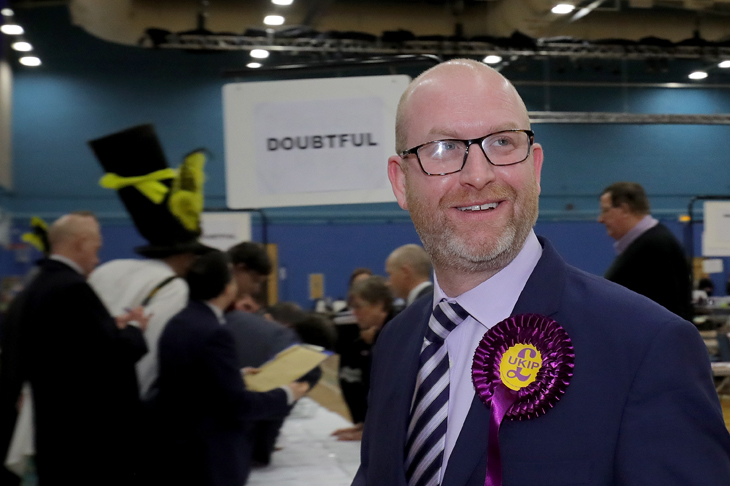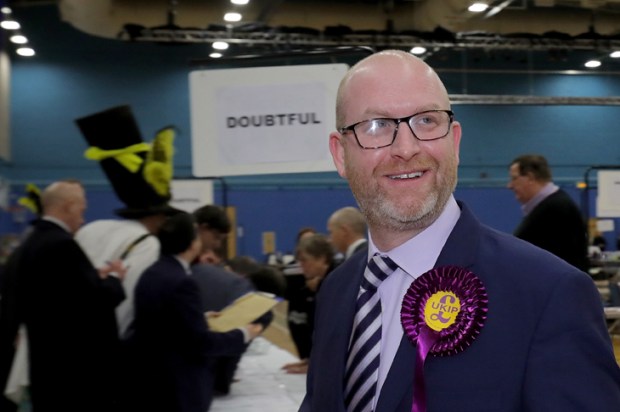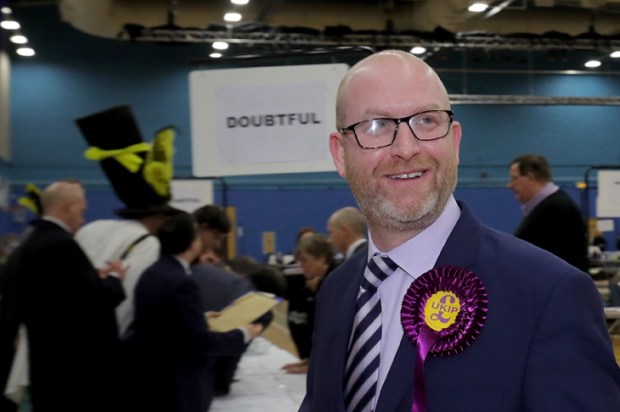Poor Paul Nuttall. He seemed to have everything a cheeky by-election victor needed: the outsider vim, the accent, the cap. Then it emerged he had made stuff up about Hillsborough. That was that. He moved from admirable Scouser to tragedy-crasher.
In interviews over the years, Nuttall has referred to being at the stadium in Sheffield on the terrible day, and he still insists he was. We shall probably never know why that developed on his website into his having lost ‘close personal friends’ there — something which is not, it seems, true.
Yet while it is good fun blowing raspberries and deriding politicians, we should allow them a little understanding too. After all, who is not susceptible to a soupçon of Falstaffian exaggeration in their stories? There is a line between lying and honest mistakes, but exaggeration is not always a conscious error. It may start from a wish to impress. But if not challenged, then in time the exaggeration feels more comfortable than the earlier version, and consciously at first, unconsciously at some point after, it replaces the real memory.
I became interested in this business some years ago when writing a book on Northern Ireland. I began to tally every person who claimed to have done the same strange and almost grotesque act of kindness — which in reality not more than one person could ever have done — during one of the most notorious episodes of the Troubles. I concluded that they probably all believed their stories and would continue to do so even if someone pointed out that they couldn’t have been where they said they were. Years of telling the story had changed their recollection. Crucially, they adapted it in a way that was plausible to others and plausible to their own other memories.
Somebody who had themselves been to prison thanks to another person’s false memory read my book and recommended that I look at Daniel Schacter’s The Seven Sins of Memory (2001). It’s an extraordinary insight into how our minds work. Schacter, a Harvard psychologist, goes through a set of vulnerabilities to which we are prone. We might think of our memory as a huge filing cabinet, but in fact it’s a great heap of memories which move even as we try to contemplate them. There is for instance the problem of ‘suggestibility’, whereby someone else places a memory with us that overrides and becomes our memory. Then there is bias: our mind adapts what it knows in order to fit in with our pre-conceived views.
There are obvious reasons why politicians might be prone to such memory sins. And while the rest of us can sleep sound with our unreliable memories, people in the public eye are always at risk of being caught out.
Hillary Clinton was a high-level casualty of all this during her 2008 presidential campaign. During a speech she recalled a moment 12 years earlier in Bosnia. ‘I remember landing under sniper fire,’ she told her crowd. ‘There was supposed to be some kind of a greeting ceremony at the airport, but instead we just ran with our heads down to get into the vehicles to get to our base.’ Alas, video footage soon emerged of her arrival in Tuzla. She was shown strolling — with her daughter Chelsea — to a reception committee of local children who hugged her. Had the whole scene been accompanied by a live string quartet it could not have been more embarrassing.
People often ask why a high-profile figure would tell such a flagrant lie. Clinton’s opponents lambasted her, but the cause may have been less than venal. A female politician from the Washington bubble running for president has a disproportionate need to show toughness. It’s likely that over the years Hillary had used her landing in Tuzla — to herself or others — as a private reassurance on that score. In time the tough version became her memory, and it may well have been that for her, at any rate, an arrival at such a place at such a time did seem scarier than it looks on tape.
Most of us are fortunate enough not to see our memories go through fact-checking. This is not an argument that we should allow politicians to get away with porkies. Rather, it is to point out that when this sort of thing happens we might greet it not just with laughter but a scintilla of sympathy, too.
In the meantime we might ponder why our politicians who seek to impress us might now have a suggestibility bias not towards heroism (as Clinton did) but towards suffering (as Nuttall does). Memory faults may tell us about an individual, but that oddity surely tells us something about our society.
Got something to add? Join the discussion and comment below.
Get 10 issues for just $10
Subscribe to The Spectator Australia today for the next 10 magazine issues, plus full online access, for just $10.















Comments
Don't miss out
Join the conversation with other Spectator Australia readers. Subscribe to leave a comment.
SUBSCRIBEAlready a subscriber? Log in